Bank of England: Portraits of a Queen
As the United Kingdom and other Commonwealth realms mourn the sad loss of their queen in September 2022 after coins and banknotes featuring her effigy have circulated for the past seven decades, here comes an unmissable monetary retrospective via a series of articles dedicated to Her Majesty Queen Elizabeth II.

Despite what one might think, it is not a matter of course that the portrait of the King (or rather Queen in this case) of the United Kingdom appears on the banknotes.
In fact, it was not until 1956 that the Bank of England received authorization for the very first time to include the portrait of Her Majesty Queen Elizabeth II on its banknotes. She was thus the first monarch to feature.
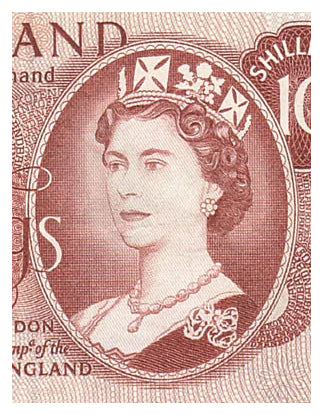
1960-1961
The first banknote to feature the image of the queen, sporting the Diamond Diadem for the occasion, was a £1 note issued in 1960 and featuring a portrait by Robert Austin
A ten shilling note followed in 1961.
The portrait by Robert Austin was criticized for being a severe and unrealistic likeness.
Geldschein Großbritannien
1 Pound, 1960-1978, Undated (1960-1961), KM:374a, S
Geldschein Großbritannien
10 Shillings, 1960-1964, 1966-1970, KM:373c, VZ
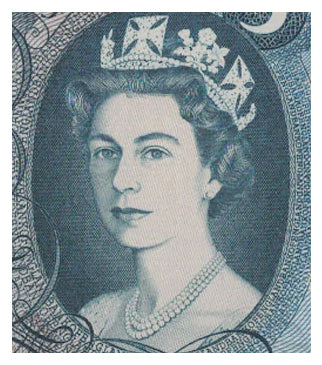
1963-1964
(Series C)
1963 and 1964 saw the successive issuing of £5 and £10 notes with a new portrait, this time by Reynolds Stone.
The Queen appeared less hieratic, and the portrait was seen as more realistic in the eyes of the public.
Geldschein Großbritannien
5 Pounds, 1963, Undated (1963), KM:375a, VZ+
Geldschein Großbritannien
10 Pounds, Undated (1964-1975), KM:376c, VZ
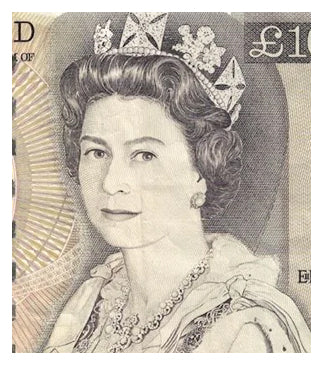
1970s
(Series D)
1970 saw the arrival of the decimal system. A new series of banknotes was issued with two different portraits of the Queen: the first features on the smaller £1 and £5 notes, while the second appears on the “high sum” £10, £20, and £50 notes.
The portrait on the reverse is by Harry Eccleston and shows Queen Elizabeth II in full regalia, wearing the ceremonial clothes usually worn for the State Opening of Parliament. She is still sporting the Diamond Diadem as well as the collar of the Order of the Garter.
The smaller notes show Her Majesty wearing the dark blue robes of the Order of the Garter.
It is worth nothing that this series was also the first to feature historical figures on the reverse.
For example, the Duke of Wellington appears on the £5 note and the unmistakable William Shakespeare on the £20 note.
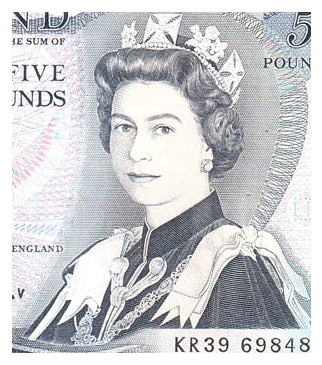
Geldschein Großbritannien
1 Pound, Undated (1978-84), KM:377b, UNZ
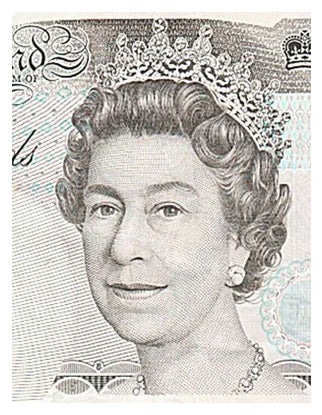
1990s
(Series E)
In 1990, Queen Elizabeth II turned 64. A new £5 note was issued with a more mature portrait of Her Majesty, painted by Roger Withington.
This portrait has been used on all Bank of England notes ever since.
2000s
(Series F)
The 2000s saw the introduction of a new design, although the same portrait was retained. The new banknotes featured more colors and security features. The reverse of the £20 note became home to Adam Smith, while Winston Churchill settled for that of the £5 note.
2010s–2020s
(Series G)
Polymer banknotes began to be issued in 2016, starting with the £5 note featuring Winston Churchill. Queen Elizabeth II’s portrait remained unchanged.
At present, there are over 4.7 billion banknotes issued by the Bank of England in circulation, worth around £82 billion in total.
As Queen Elizabeth II was the first British monarch to have her portrait printed on banknotes, King Charles III will be the second. The Bank of England has yet to announce when the new banknotes will be introduced and, of course, the portrait will first have to be approved by the new king.
Translated from the French by: Michael Wright
Illustrations
- Queen Elizabeth II with several of her prime ministers and other Commonwealth of Nations leaders at the 1960 Commonwealth Prime Ministers’ Conference (Public domain)
Sources
- https://www.bankofengland.co.uk/museum/noteworthy-women/the-queen-on-bank-of-england-notes
- https://www.escapadesalondres.com/pages/les-bons-plans/bons-plans-vie-pratique/entre-pound-penny-pence-livre-sterling-comment-se-retrouver-parmi-ces-pieces.html
- https://www.nytimes.com/interactive/2022/09/18/business/queen-elizabeth-king-charles-britain.html

































